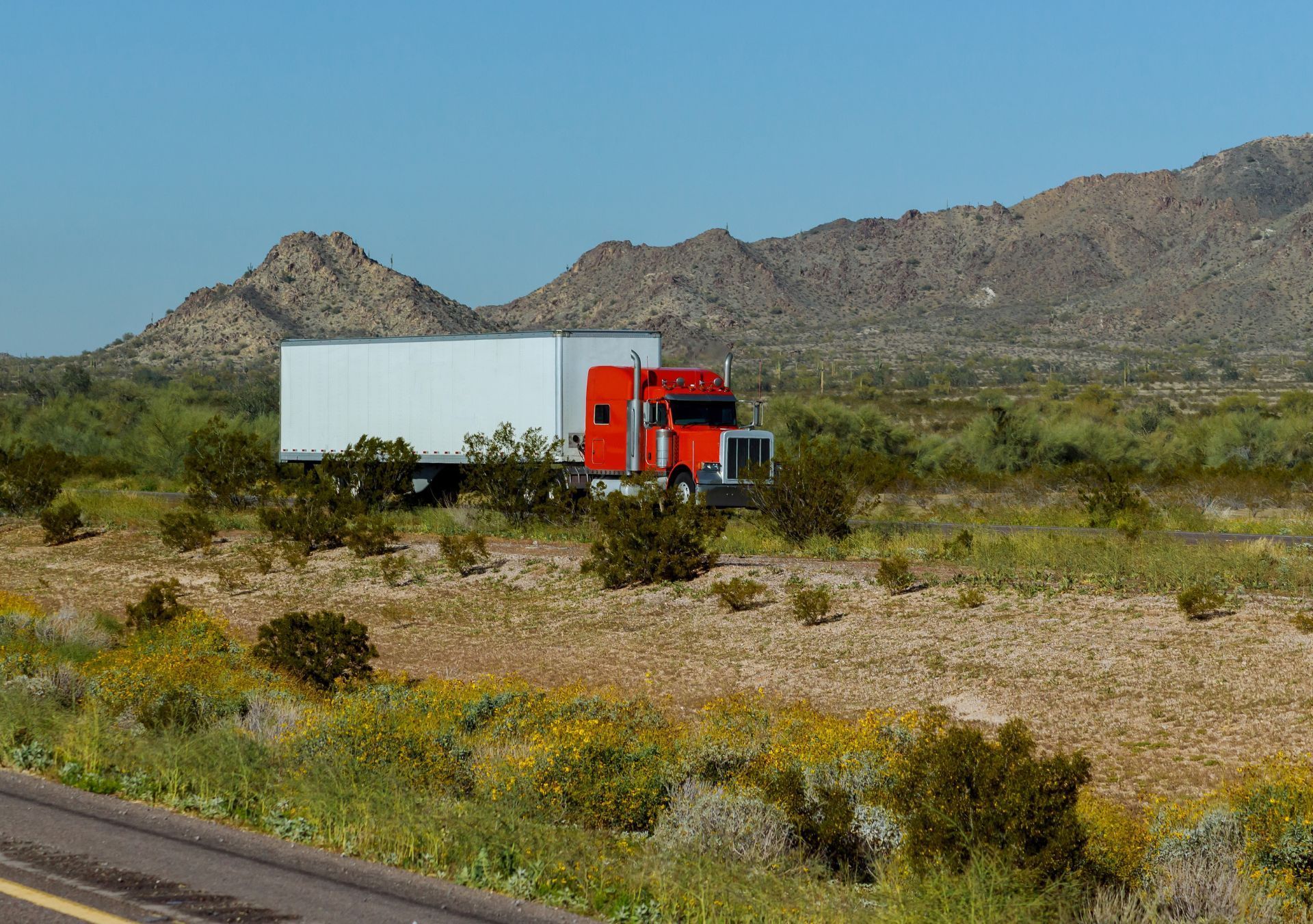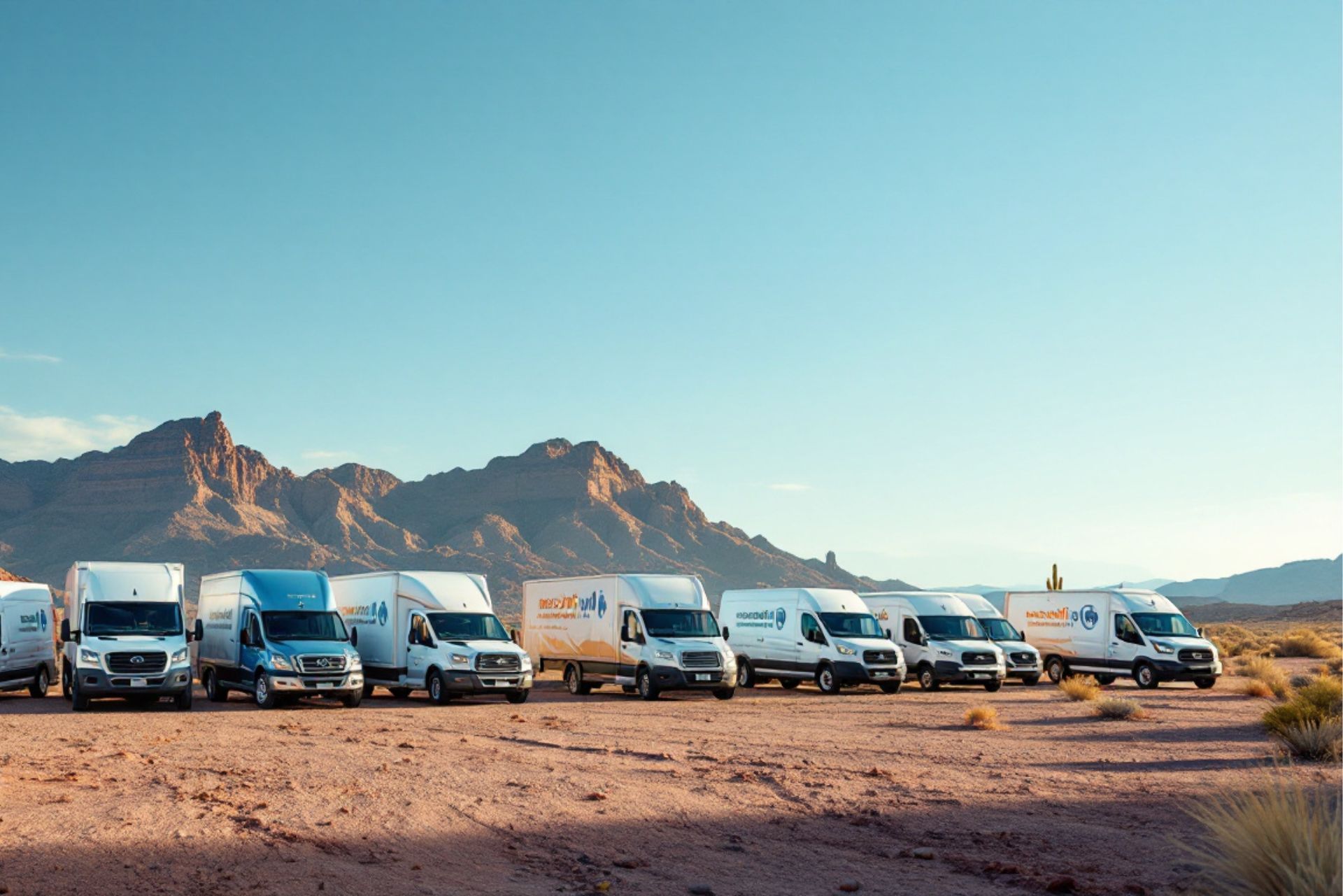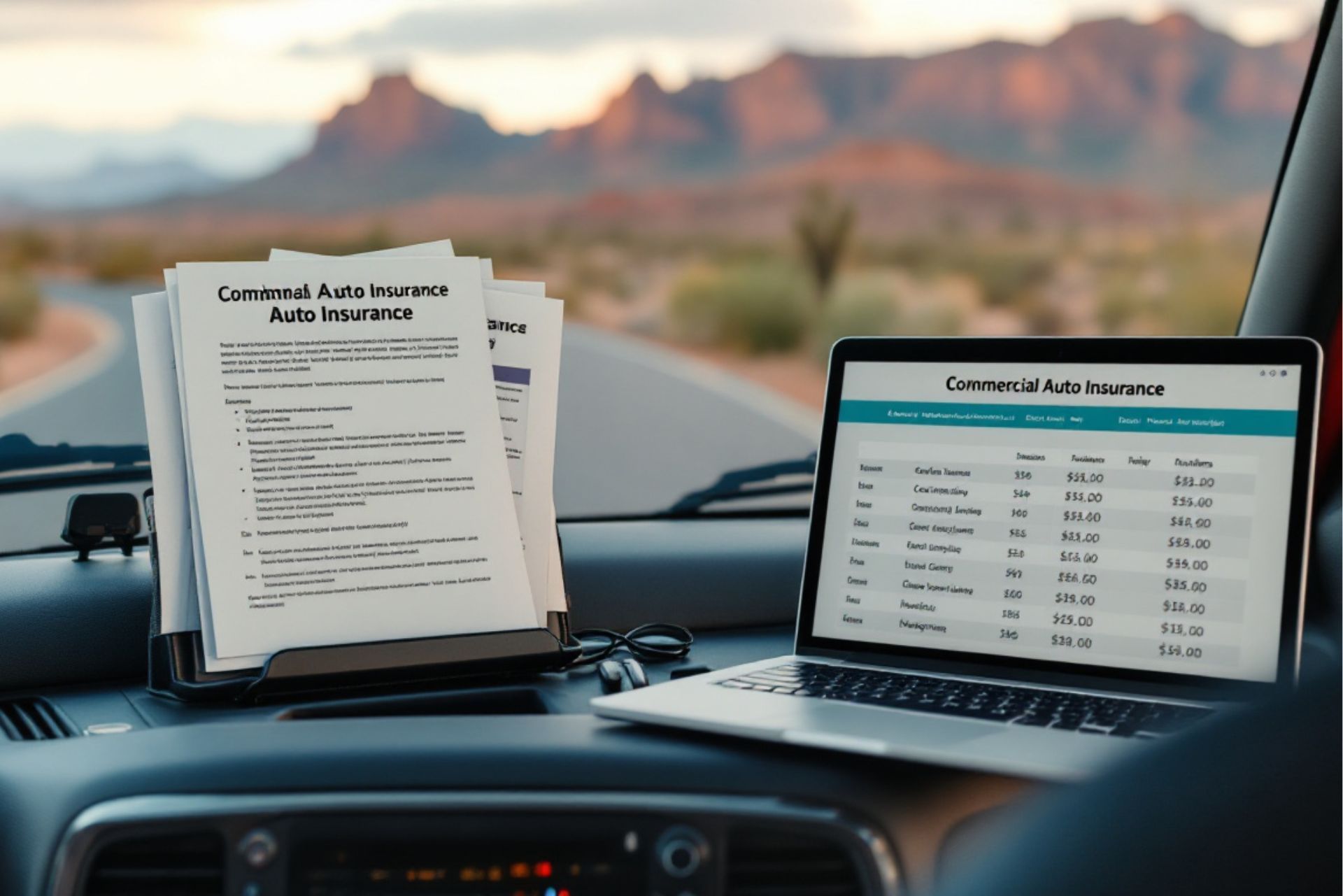Arizona Commercial Auto Insurance
See How We're Different:
or Call Us:(480) 526-3222

Most Common Business Policies
Index
What is Commercial Auto Insurance?
Arizona State Requirements for Commercial Auto Insurance
Factors Affecting Commercial Auto Insurance Rates in Arizona
How to Choose the Right Commercial Auto Insurance Policy
Common Exclusions in Commercial Auto Insurance Policies
The Claims Process: What to Expect
Contact Us
In the vast landscape of Arizona's business environment, commercial auto insurance plays a crucial role in safeguarding companies that rely on vehicles for their operations. Whether it's a small delivery service or a large fleet of trucks, understanding the intricacies of commercial auto insurance is essential for any business owner. This article delves into the various aspects of commercial auto insurance in Arizona, providing valuable insights for those looking to protect their business assets.
What is Commercial Auto Insurance?
Commercial auto insurance is a specialized type of insurance designed to cover vehicles used for business purposes. Unlike personal auto insurance, which is intended for personal vehicles, commercial auto insurance provides coverage for vehicles owned by a business, including cars, trucks, vans, and trailers. This type of insurance is essential for businesses that use vehicles to transport goods, provide services, or conduct any other business-related activities. The importance of this coverage cannot be overstated, as it not only protects the vehicles but also safeguards the business against potential liabilities that could arise from their use.
Types of Coverage
Commercial auto insurance typically includes several types of coverage that can be tailored to meet the specific needs of a business. These include:
- Liability Coverage: This is the most basic form of coverage and is legally required in Arizona. It covers damages to other people and their property if your vehicle is involved in an accident.
- Collision Coverage: This type of coverage pays for damages to your vehicle resulting from a collision, regardless of who is at fault.
- Comprehensive Coverage: Comprehensive coverage protects against non-collision-related incidents, such as theft, vandalism, or natural disasters.
- Uninsured/Underinsured Motorist Coverage: This provides protection if your vehicle is involved in an accident with a driver who lacks sufficient insurance.
Why is it Important?
Having the right commercial auto insurance is vital for several reasons. Firstly, it helps protect the business's financial assets in case of an accident. Without adequate coverage, a business could face significant out-of-pocket expenses that could jeopardize its operations. For instance, if a delivery truck is involved in an accident and sustains extensive damage, the costs of repairs or replacement could be substantial, potentially leading to financial strain or even bankruptcy for smaller businesses.
Secondly, commercial auto insurance can enhance a company's credibility. Clients and partners often prefer to work with businesses that are adequately insured, as it demonstrates professionalism and responsibility. Furthermore, having comprehensive coverage can also provide peace of mind for employees who drive company vehicles, knowing that they are protected while performing their duties. This can lead to increased job satisfaction and a more productive workforce, as employees feel secure in their roles and confident in the support provided by their employer.

Arizona State Requirements for Commercial Auto Insurance
In Arizona, businesses are required to carry a minimum amount of liability insurance for their commercial vehicles. The state mandates that drivers have at least:
- $15,000 for bodily injury per person
- $30,000 for bodily injury per accident
- $10,000 for property damage
These minimums are designed to protect other drivers and their property in the event of an accident. However, for many businesses, these minimum limits may not be sufficient, especially if they operate larger vehicles or transport valuable goods. In fact, the financial implications of a serious accident can far exceed these limits, leading to significant out-of-pocket expenses for the business involved. Thus, understanding the potential risks and liabilities is crucial for any business owner.
Additional Coverage Considerations
While meeting the state minimum requirements is essential, businesses should consider additional coverage options to ensure comprehensive protection. Factors such as the type of vehicles used, the nature of the business, and the potential risks involved should all be taken into account when determining coverage needs. For instance, a construction company that operates heavy machinery on public roads may face different risks compared to a small catering business that uses a van for deliveries.
For example, a delivery service might benefit from cargo insurance, which covers goods being transported in case of an accident or theft. This type of insurance can be particularly valuable for businesses that handle high-value items, as it provides an added layer of security against potential losses. Similarly, businesses that use vehicles for transporting passengers may need additional liability coverage to protect against potential claims. This could include coverage for medical expenses and legal fees if an accident occurs while transporting clients or employees. Additionally, businesses may want to explore options such as
comprehensive and collision coverage, which can help cover damages to their own vehicles in the event of an accident, theft, or natural disaster, ensuring that they remain operational even in challenging circumstances.
Factors Affecting Commercial Auto Insurance Rates in Arizona
The cost of commercial auto insurance can vary significantly based on several factors. Understanding these factors can help business owners make informed decisions when purchasing coverage.
Type of Vehicle
The type of vehicle being insured plays a crucial role in determining insurance rates. Larger vehicles, such as trucks and vans, typically have higher premiums due to the increased risk and potential for more severe accidents. Additionally, vehicles with advanced safety features may qualify for discounts, as they are considered less risky to insure. For instance, vehicles equipped with anti-lock brakes, electronic stability control, and advanced airbag systems can often lead to lower premiums, as insurers recognize the reduced likelihood of injury and damage in the event of an accident. Furthermore, the age and condition of the vehicle can also influence rates; newer models may come with better safety ratings and technology that can mitigate risks, while older vehicles might lack these features and thus incur higher costs.
Driving History
The driving history of the individuals operating the vehicles is another critical factor. A clean driving record with no accidents or violations can lead to lower insurance premiums. Conversely, a history of accidents or traffic violations may result in higher rates, as insurers view these drivers as higher risk. Insurers often assess not just the frequency of incidents but also their severity. For example, a single major accident can have a more significant impact on rates than multiple minor infractions. Additionally, the length of time a driver has been licensed can also play a role; inexperienced drivers might face higher premiums due to their lack of established driving habits. Businesses that invest in driver training programs can sometimes benefit from lower rates, as they demonstrate a commitment to safety and risk management.
Business Operations
The nature of the business and how the vehicles are used can also impact insurance costs. Businesses that frequently operate in high-risk environments or those that transport hazardous materials may face higher premiums. Additionally, the mileage driven annually can affect rates, with higher mileage often leading to increased costs. For example, a delivery service that covers extensive distances daily may be viewed as a higher risk compared to a local service that operates within a limited area. Moreover, the type of cargo being transported can also influence rates; businesses that transport valuable or fragile items might face higher premiums due to the increased risk of theft or damage. Insurers may also consider the time of day that vehicles are typically on the road, as nighttime driving can present additional hazards, potentially leading to higher rates for businesses that operate late into the evening.
How to Choose the Right Commercial Auto Insurance Policy
Selecting the right commercial auto insurance policy requires careful consideration of various factors. Here are some steps to guide business owners in making the best choice:
Assess Your Needs
Before shopping for insurance, it's essential to assess the specific needs of the business. Consider the types of vehicles used, the nature of operations, and the level of risk involved. Understanding these factors will help in determining the appropriate coverage levels and types. For instance, a company that relies heavily on delivery vehicles may need higher liability limits and comprehensive coverage to protect against potential accidents and damages. Additionally, businesses that operate in urban areas with heavy traffic may face different risks compared to those in rural settings, thus influencing the type of policy that would best suit their needs.
Shop Around
It's advisable to obtain quotes from multiple insurance providers to compare coverage options and rates. Each insurer may offer different policies and discounts, so shopping around can lead to significant savings. Additionally, consider working with an insurance broker who specializes in commercial auto insurance, as they can provide valuable insights and help navigate the complexities of various policies. Brokers often have access to a wider range of options and can tailor recommendations based on the specific needs of your business. Furthermore, taking the time to read customer reviews and ratings can provide additional context about the reliability and customer service of different insurance companies.
Read the Fine Print
When reviewing insurance policies, it's crucial to read the fine print. Pay attention to coverage limits, exclusions, and any additional fees. Understanding the terms of the policy will help avoid surprises in the event of a claim. For example, some policies may exclude coverage for certain types of incidents, such as accidents that occur while the vehicle is being used for personal purposes. Additionally, it's important to be aware of the claims process outlined in the policy, including any required documentation and timelines for reporting incidents. This knowledge can be invaluable in ensuring that claims are processed smoothly and efficiently when the need arises.

Common Exclusions in Commercial Auto Insurance Policies
While commercial auto insurance provides essential coverage, it's important to be aware of common exclusions that may apply. Understanding these exclusions can help businesses avoid potential pitfalls.
Personal Use Exclusion
Many commercial auto insurance policies include a personal use exclusion, which means that coverage may not apply if a vehicle is used for personal purposes. Business owners should ensure that their employees understand the importance of using company vehicles solely for business-related activities. This exclusion can lead to significant financial losses if an employee is involved in an accident while using a company vehicle for personal errands. To mitigate this risk, businesses can implement clear policies regarding vehicle use and provide training sessions to reinforce these guidelines.
Employee Exclusions
Some policies may exclude coverage for certain employees, particularly if they have a poor driving record or are not listed on the policy. It's essential to verify that all employees who will be driving company vehicles are adequately covered under the policy. Additionally, businesses should regularly review their employee roster and driving records to ensure compliance with insurance requirements. This proactive approach can help prevent disputes with insurance providers in the event of an accident and ensure that all drivers are qualified and responsible.
Intentional Damage
Commercial auto insurance typically does not cover damages resulting from intentional acts or criminal activities. Businesses should be aware that any illegal activities conducted using company vehicles may not be covered by their insurance policy. Furthermore, this exclusion can extend to situations where employees engage in reckless behavior, such as street racing or driving under the influence. To protect their assets, companies should foster a culture of safety and responsibility, clearly communicating the consequences of such actions and the potential impact on insurance coverage.
Uninsured Motorist Exclusion
Another common exclusion is related to uninsured motorists. If a company vehicle is involved in an accident with a driver who does not have insurance, the commercial auto policy may not cover the damages unless specific uninsured motorist coverage is included. This can leave businesses vulnerable to significant out-of-pocket expenses. To address this risk, companies should consider adding uninsured motorist coverage to their policy, providing an extra layer of protection against potential financial losses in the event of an accident with an uninsured driver.
Use of Non-Owned Vehicles
Many commercial auto insurance policies also exclude coverage for non-owned vehicles, which are vehicles that are not owned by the business but may be used for business purposes. This can include employee-owned vehicles used for work tasks. If an employee is driving their personal vehicle for a company-related errand and gets into an accident, the business may not be liable for damages. To mitigate this risk, businesses can encourage employees to maintain their own personal auto insurance and consider providing reimbursement for business-related mileage, ensuring that both the employee and the company are protected in case of an incident.
The Claims Process: What to Expect
In the unfortunate event of an accident or damage to a commercial vehicle, understanding the claims process is essential for a smooth resolution. Here’s what business owners can expect:
Reporting the Incident
The first step in the claims process is to report the incident to the insurance provider as soon as possible. Most insurers have a designated claims hotline that can be contacted 24/7. Providing detailed information about the accident, including the time, location, and any other parties involved, will help expedite the process.
Documentation
Documentation is critical when filing a claim. Business owners should gather all relevant information, including police reports, photographs of the accident scene, and witness statements. This documentation will support the claim and help the insurer assess the situation accurately.
Claim Review and Resolution
After the claim is submitted, the insurance company will review the information provided and may assign an adjuster to investigate the incident further. The adjuster will assess the damages and determine the amount of compensation that will be awarded. Once the review is complete, the insurer will communicate the decision and provide instructions for any necessary repairs or reimbursements.
Tips for Reducing Commercial Auto Insurance Costs
Implement Safety Programs
Investing in safety training programs for employees can lead to fewer accidents and claims, ultimately lowering insurance premiums. Teaching safe driving practices and conducting regular vehicle maintenance can significantly reduce risks associated with commercial vehicle operations.
Increase Deductibles
Choosing a higher deductible can lower monthly premiums. However, it's essential to ensure that the business can afford the deductible amount in the event of a claim. Balancing premium costs with potential out-of-pocket expenses is crucial.
Bundle Insurance Policies
Many insurance providers offer discounts for bundling multiple policies, such as commercial auto insurance with
general liability or
property insurance. Exploring these options can lead to significant savings on overall insurance costs.
Conclusion
Arizona commercial auto insurance is a vital component of protecting businesses that rely on vehicles for their operations. Understanding the types of coverage available, state requirements, and factors affecting insurance rates can help business owners make informed decisions. By assessing their unique needs, shopping around for quotes, and implementing safety measures, companies can secure the right coverage while potentially reducing costs.
In a state as dynamic as Arizona, having adequate commercial auto insurance not only ensures compliance with legal requirements but also provides peace of mind, allowing business owners to focus on what they do best—running their business.
